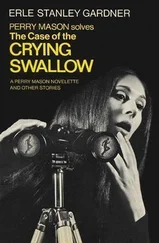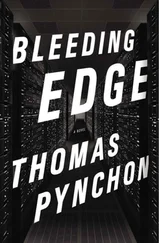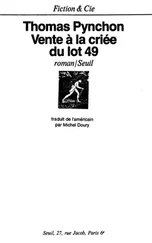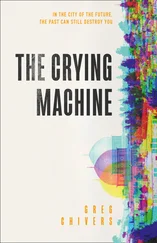It may have been some vision of the continent-wide power structure Hinckart could have taken over, now momentarily weakened and tottering, that inspired Tristero to set up his own system. He seems to have been highly unstable, apt at any time to appear at a public function and begin a speech. His constant theme, disinheritance. The postal monopoly belonged to Ohain by right of conquest, and Ohain belonged to Tristero by right of blood. He styled himself El Deshe-redado, The Disinherited, and fashioned a livery of black for his followers, black to symbolize the only thing that truly belonged to them in their exile: the night. Soon he had added to his iconography the muted post horn and a dead badger with its four feet in the air (some said that the name Taxis came from the Italian tasso, badger, referring to hats of badger fur the early Bergamascan couriers wore). He began a sub rosa campaign of obstruction, terror and depredation along the Thurn and Taxis mail routes.
Oedipa spent the next several days in and out of libraries and earnest discussions with Emory Bortz and Genghis Cohen. She feared a little for their security in view of what was happening to everyone else she knew. The day after reading Blobb's Peregrinations she, with Bortz, Grace, and the graduate students, attended Randolph Driblette's burial, listened to a younger brother's helpless, stricken eulogy, watched the mother, spectral in afternoon smog, cry, and came back at night to sit on the grave and drink Napa Valley muscatel, which Driblette in his time had put away barrels of. There was no moon, smog covered the stars, all black as a Tristero rider. Oedipa sat on the earth, ass getting cold, wondering whether, as Driblette had suggested that night from the shower, some version of herself hadn't vanished with him. Perhaps her mind would go on flexing psychic muscles that no longer existed; would be betrayed and mocked by a phantom self as the amputee is by a phantom limb. Someday she might replace whatever of her had gone away by some prosthetic device, a dress of a certain color, a phrase in a ' letter, another lover. She tried to reach out, to whatever coded tenacity of protein might improbably have held on six feet below, still resisting decay-any stubborn quiescence perhaps gathering itself for some last burst, some last scramble up through earth, just-glimmering, holding together with its final strength a transient, winged shape, needing to settle at once in the warm host, or dissipate forever into the dark. If you come to me, prayed Oedipa, bring your memories of the last night. Or if you have to keep down your payload, the last five minutes-that may be enough. But so I'll know if your walk into the sea had anything to do with Tristero. If they got rid of you for the reason they got rid of Hilarius and Mucho and Metzger-maybe because they thought I no longer needed you. They were wrong. I needed you. Only bring me that memory, and you can live with me for whatever time I've got. She remembered his head, floating in the shower, saying, you could fall in love with me. But could she have saved him? She looked over at the girl who'd given her the news of his death. Had they been in love? Did she know why Driblette had put in those two extra lines that night? Had he even known why? No one could begin to trace it. A hundred hangups, permuted, combined-sex, money, illness, despair with the history of his time and place, who knew. Changing the script had no clearer motive than his suicide. There was the same whimsy to both. Perhaps-she felt briefly penetrated, as if the bright winged thing had actually made it to the sanctuary of her heart-perhaps, springing from the same slick labyrinth, adding those two lines had even, in a way never to be explained, served him as a rehearsal for his night's walk away into that vast sink of the primal blood the Pacific. She waited for the winged brightness to announce its safe arrival. But there was silence. Driblette, she called. The signal echoing down twisted miles of brain circuitry. Driblette!
But as with Maxwell's Demon, so now. Either she could not communicate, or he did not exist.
Beyond its origins, the libraries told her nothing more about Tristero. For all they knew, it had never survived the struggle for Dutch independence. To find the rest, she had to approach from the Thurn and Taxis side. This had its perils. For Emory Bortz it seemed to turn into a species of cute game. He held, for instance, to a mirror-image theory, by which any period of instability for Thurn and Taxis must have its reflection in Tristero's shadow-state. He applied this to the mystery of why the dread name should have appeared in print only around the middle of the 17th century. How had the author of the pun on "this Trystero dies irae" overcome his reluctance? How had half the Vatican couplet, with its suppression of the "Trystero" line, found its way into the Folio? Whence had the daring of even hinting at a Thurn and Taxis rival come? Bortz maintained there must have been some crisis inside Tristero grave enough to keep them from retaliating. Perhaps the same that kept them from taking the life of Dr. Blobb.
But should Bortz have exfoliated the mere words so lushly, into such unnatural roses, under which, in whose red, scented dusk, dark history slithered unseen? When Leonard II-Francis, Count of Thurn and Taxis, died in 1628, his wife Alexandrine of Rye succeeded him in name as postmaster, though her tenure was never considered official. She retired in 1645. The actual locus of power in the monopoly remained uncertain until 1650, when the next male heir, Lamoral II-Claude-Francis, took over. Meanwhile, in Brussels and Antwerp signs of decay in the system had appeared. Private local posts had encroached so far on the Imperial licenses that the two cities shut down their Thurn and Taxis offices.
How, Bortz asked, would Tristero have responded? Postulating then some militant faction proclaiming the great moment finally at hand. Advocating a takeover by force, while their enemy was vulnerable. But conservative opinion would care only to continue in opposition, exactly as the Tristero had these seventy years. There might also be, say, a few visionaries: men above the immediacy of their time who could think historically. At least one among them hip enough to foresee the end of the Thirty Years' War, the Peace of Westphalia, the breakup of the Empire, the coming descent into particularism.
"He looks like Kirk Douglas," cried Bortz, "he's wearing this sword, his name is something gutsy like Konrad. They're meeting in the back room of a tavern, all these broads in peasant blouses carrying steins around, everybody juiced and yelling, suddenly Konrad jumps up on a table. The crowd hushes, 'The salvation of Europe,' Konrad says, 'depends on communication, right? We face this anarchy of jealous German princes, hundreds of them scheming, counter-scheming, infighting, dissipating all of the Empire's strength in their useless bickering. But whoever could control the lines of communication, among all these princes, would control them. That network someday could unify the Continent. So I propose that we merge with our old enemy Thurn and Taxis-' Cries of no, never, throw the traitor out, till this barmaid, little starlet, sweet on Konrad, cold-conks with a stein his loudest antagonist. 'Together,' Konrad is saying, 'our two systems could be invincible. We could refuse service on any but an Imperial basis. Nobody could move troops, farm produce, anything, without us. Any prince tries to start his own courier system, we suppress it. We, who have so long been disinherited, could be the heirs of Europe!' Prolonged cheering."
"But they didn't keep the Empire from falling apart," Oedipa pointed out.
"So," Bortz backing off, "the militants and the conservatives fight to a standstill, Konrad and his little group of visionaries, being nice guys, try to mediate, the hassle, by the time they all get squared away again, everybody's played out, the Empire's had it, Thurn and Taxis wants no deals."
Читать дальше












